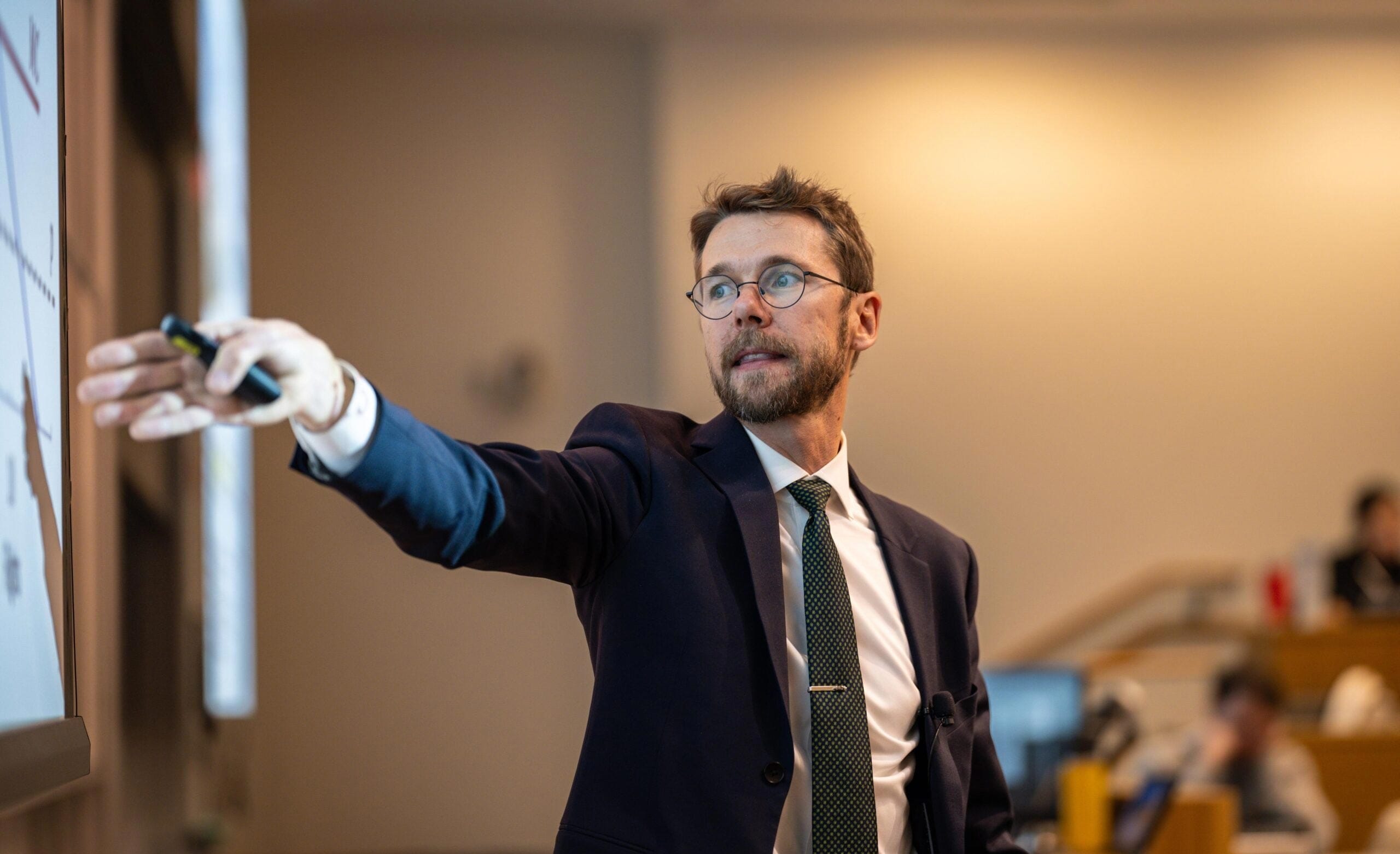In 1979, the Philadelphia Federal Reserve got an important phone call. The Wharton dean at the time, Donald Carroll, contacted Fed employee Anita Summers with a unique job offer.
“A public policy program in a business school?” the late Summers remembered asking. Dean Carroll confirmed: “We’ll be the first.”
The goal was to give students an understanding of how economics and political science intertwine so they could affect policy wherever they ended up working. With no framework for the nascent program, Summers, who had experience studying the efficiencies of libraries, transportation, and real estate, started with building a faculty. Once she tapped chairman of the Legal Studies Department Thomas Dunfee, who would later be considered a pioneer in the field of business ethics, and real estate professor Peter Linneman, the Business Economics and Public Policy department (BEPP) started taking shape, making its debut in 1983.
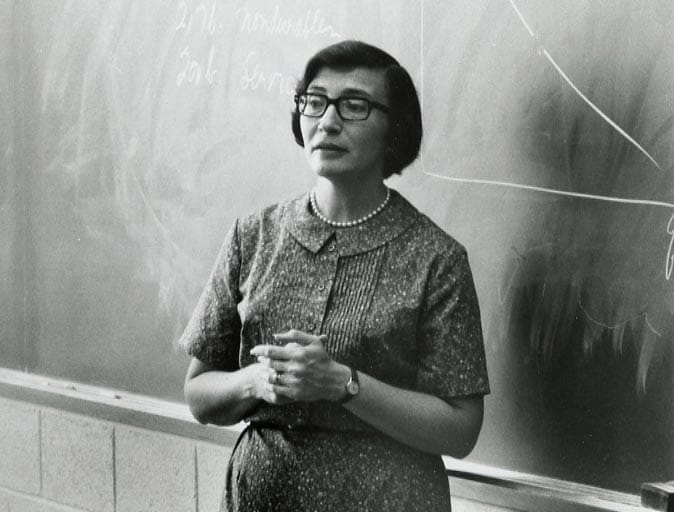
Before Wharton, Anita Summers taught economics at Swarthmore College from 1967 to 1971. (Photo courtesy of Swarthmore’s Friends Historical Library)
“Anita was doing the main lifting,” says Linneman. “These are overnight successes that take 10 years.” Summers remained a high-profile policy researcher while chairing BEPP, working closely with then-mayor Ed Rendell to provide solutions for Philadelphians, such as re-routing SEPTA buses to transport unemployed residents into suburbs in need of workers.
The faculty’s ability to lead by example with practical research was paramount to the success of BEPP, which celebrated its 40th anniversary this year. “The real advantage of a policy program in a business school is it provides that kind of melding of pushing out the research frontier, but always keeping an eye to having to make a difference on the ground,” says Department Chair and Patrick T. Harker Professor of Business Economics and Public Policy Joe Harrington.
One issue current BEPP professors are tackling on the ground is workplace discrimination. Associate professor of business economics and public policy Corrine Low and BEPP’s Howard Marks Professor Judd Kessler developed Incentivized Resume Rating, a methodology of measuring employer preferences and auditing hiring bias.
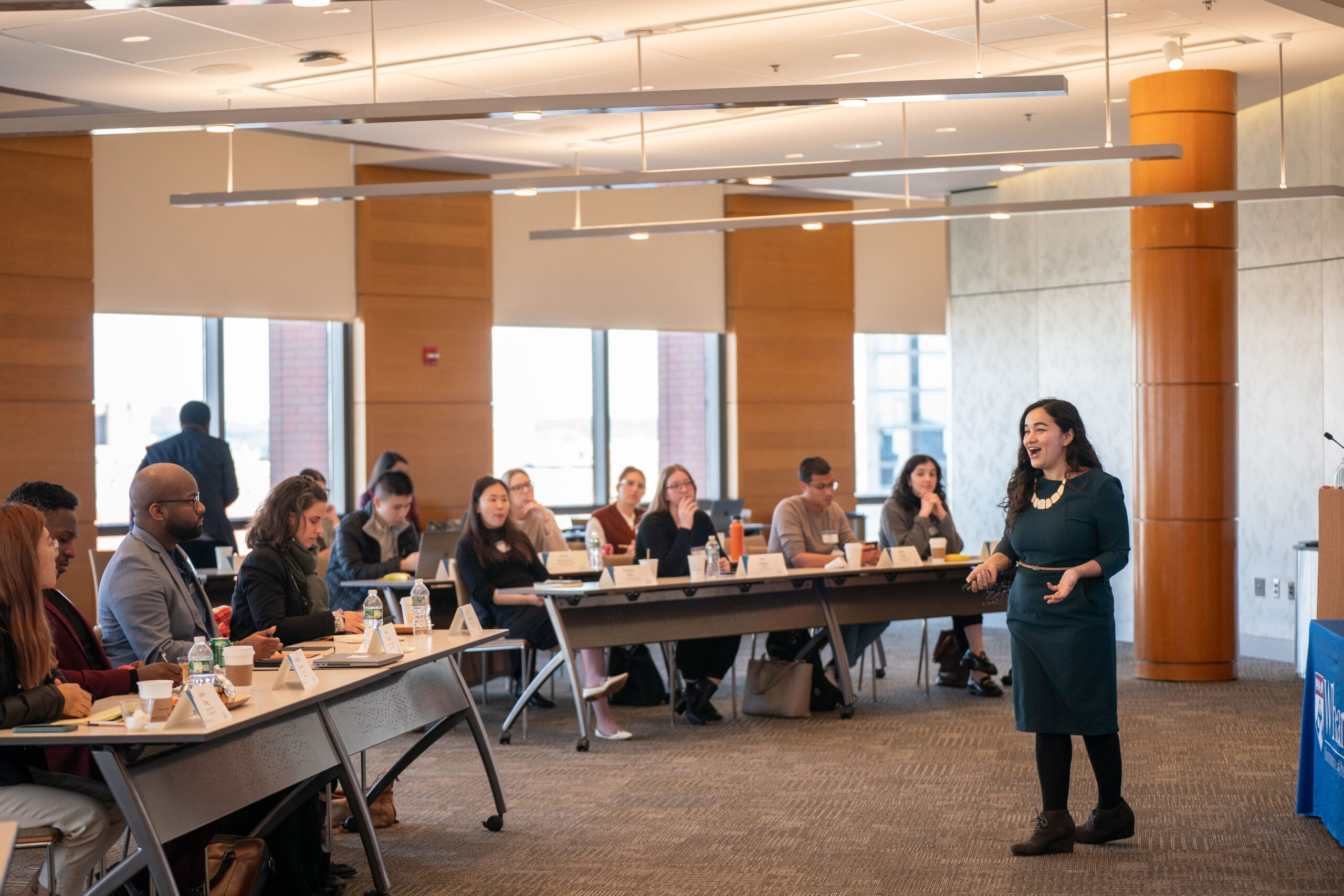
Professor Corinne Low leads a session on the Economics of Gender and Diversity at the Wharton Seminars for Business Journalists event in October. (Photo courtesy of Low)
“I try to do research that speaks to people’s real lives,” says Low, whose Economics of Diversity and Discrimination course explores questions such as what kind of maternity policy a company should have. She says the tools taught in BEPP, including reading and analyzing economic papers, apply to anyone from a government employee to a startup owner. “That’s the goal of my class—engaging with evidence so that you feel empowered to say, hey, I don’t have to look at the summary in the Financial Times or the Wall Street Journal. I can look up this study and say, ‘How do I interpret the statistics that are being used here and then apply it to the decisions that I’m making?’”
BEPP can also make alumni more effective in implementing ESG policies for their employers. Demand was so hot for ESG topics that associate professor of business economics and public policy Arthur van Benthem designed a new Energy and Environmental Economics course. In the past 10 years, van Benthem has seen a shift in employment interest from oil and gas investment banking to wind energy and the electric vehicle space. Based on self-reported data, there were 1002 alumni working in the Energy sector in FY2023, compared to just 438 in FY2002. But the biggest change since van Benthem started at BEPP 11 years ago? He no longer has to explain why studying public policy is important.
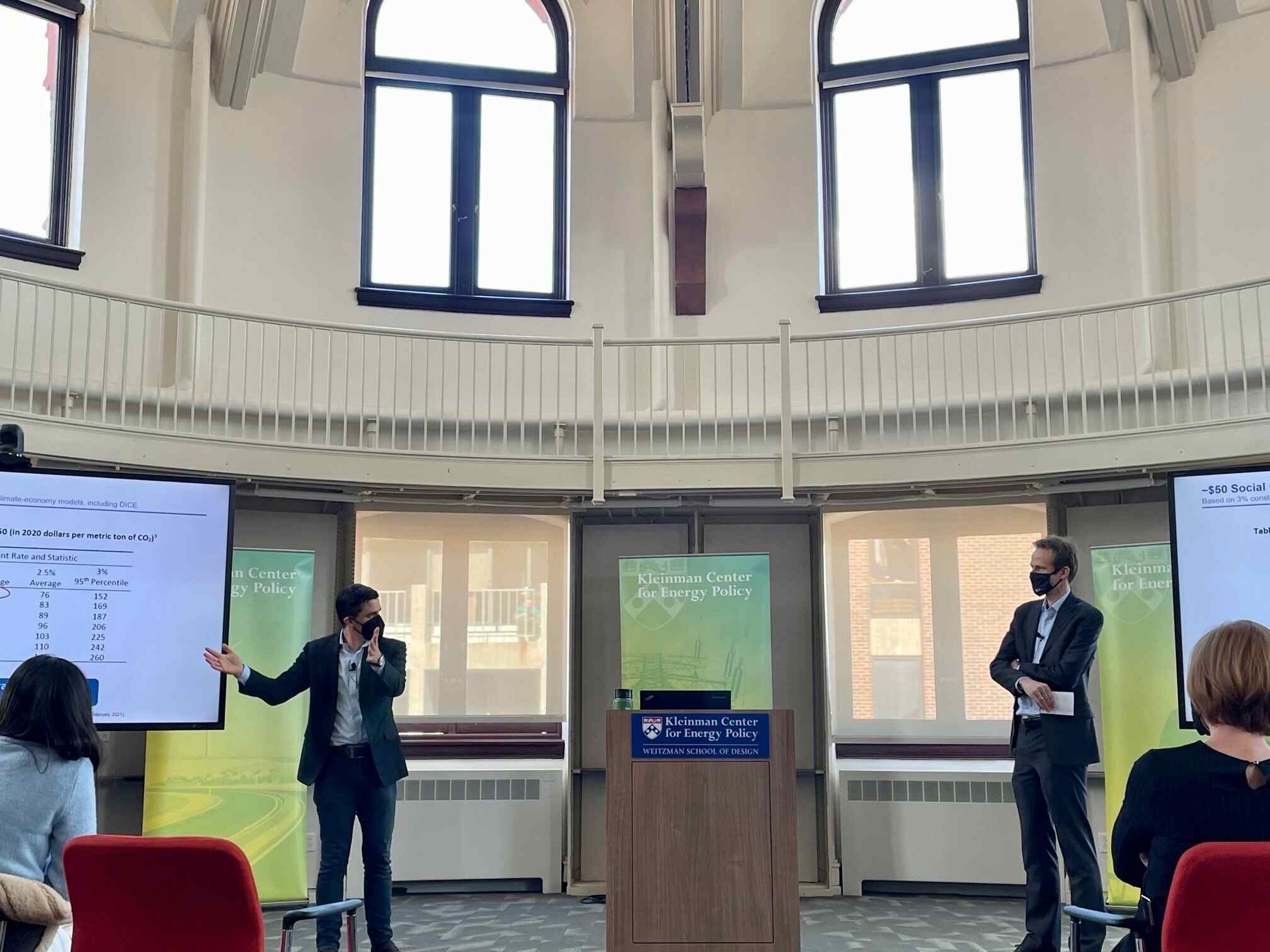
Professor Arthur van Benthem moderates a discussion on “The True Cost of Carbon” with Gernot Wagner, climate economist and NYU professor, in February 2022.
“Our MBA students are looking towards jobs that are stimulating and also adding to society in some way,” van Benthem says. “The real excitement, I think, is about how businesses can drive change on sustainability issues and that’s where the MBA students are looking.”
Technology advances over the years have improved both the research and teaching arms of BEPP. In van Benthem’s Climate and Financial Markets course, students run their own carbon market through a simulation. Faculty data collection is faster and broader. Through resources that aggregate census data, Low can draw comparisons between the U.S. and remote countries that previously required in-person visits. She collects data in Lusaka, Zambia, where the frequency of smartphone responses is high enough that Low can conduct surveys by sending a link via text. It’s a far cry from Summers knocking on 150 school doors to get data on teachers’ pay in 1979.
But alumni agree that BEPP was an innovative intellectual hub even during the 1990s. When Kevin Volpp M96 G97 GRW98, who pursued both a medical degree and a business PhD at Penn, was looking for a place to combine his interests of medicine, social science, and health policy, BEPP was the one to make that happen. “People in interviews would ask me, ‘What is the relationship between health care and economics?’ and look at me quizzically,” says Volpp. “Now that it’s 18 percent of GDP, people don’t usually ask that question.”
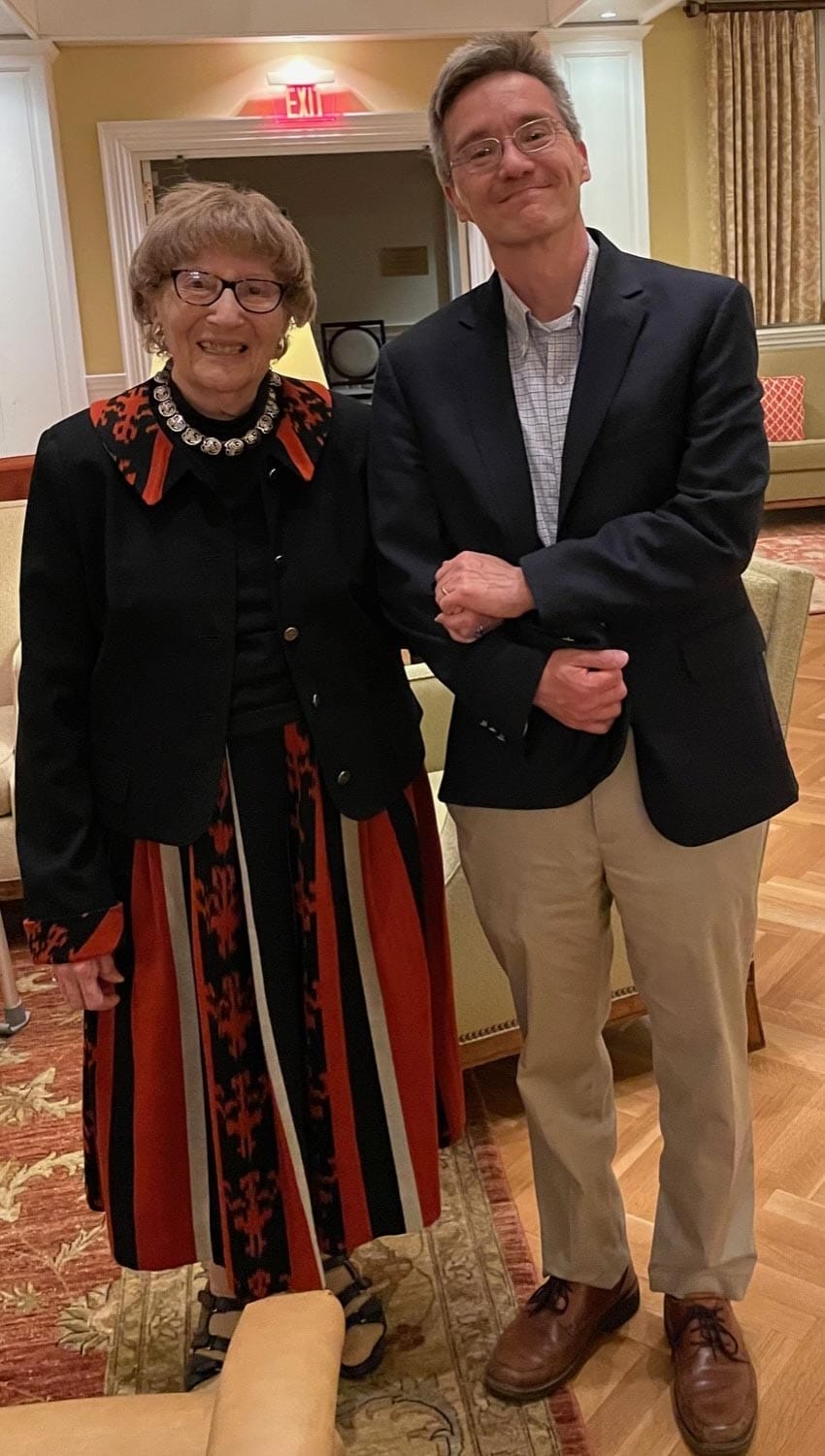
Kevin Volpp M96 G97 GRW98 and Anita Summers after their last dinner meeting about a year ago. Summers passed away in October. (Photo courtesy of Volpp)
Because of Volpp’s unique dual interest, Summers took him under her wing. And like a select few other alumni, he ended up developing a lifelong professional bond with the BEPP chair. Perhaps inspired by Summers’s leadership, Volpp is now founding Director of the Center for Health Incentives and Behavioral Economics and the Mark V. Pauly President’s Distinguished Professor at the Perelman School of Medicine and Health Care Management at Wharton. (For more about Volpp’s research and the work of other Wharton PhDs, see this feature story). Alumni remember how Summers pushed them to think critically, but they reminisce on her softer side, too. It was in her class where Lee Gatewood WG83 met his wife, Kathleen Gatewood WG83.
“Through the decades, Anita’s story was that at the beginning of the semester, I was on one side of the classroom and Kathy was on the other side,” Lee says. “And as the weeks went by, she absolutely swore that just step by step, we ended up being a little closer, to the point where she was sure that she had made a romance happen over the course of that semester.”
Aside from connecting like-minded students, BEPP also bridges topics, reflecting how economics naturally spills over a lot of different areas. Many of van Benthem’s students are pursuing an ESG major or come from the Master of Environmental Studies program or the School of Engineering. Even if they do not become economists, it benefits graduates to have a grasp of economic policy. No matter the industry, says van Benthem, “The fate of companies are determined very strongly by whatever incentives or taxes or rules governments choose to apply.”
The BEPP faculty continues to stay relevant with current trends, and students hear from guest speakers who range from entrepreneurs financing solar farms to journalists reporting on climate change. Alumni have also returned to impart real-world wisdom, including Jacqueline Volkman-Wise GRW07, a finance professor at St. Joseph’s University, who spoke in Consumer Financial Decision Making, and Gianluca Signorelli WG14, Head of Capital Markets at SB Energy (SoftBank Group), who spoke in Energy Markets & Policy.
“Now, it’s a powerhouse,” Linneman says of the department that he watched grow over four decades. “It’s by far the greatest program in the world and lots of other universities have copied or tweaked what we did over the years. The impact was much larger than just the formation.”




















